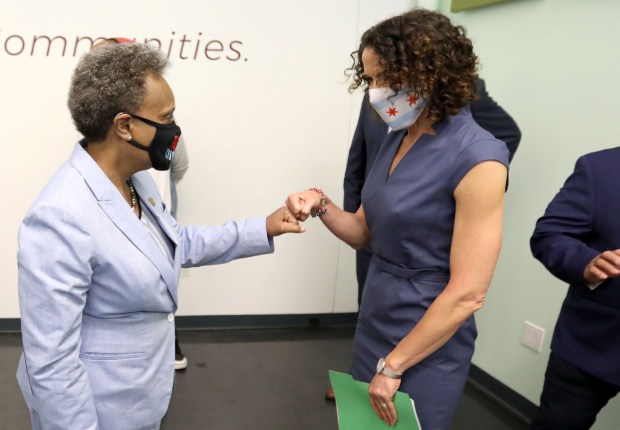Illinois’ new state-funded, court-based rental assistance program for tenants struggling to pay rent and their landlords opened Friday, according to the state.
The new program follows a federally funded, statewide program that assisted tenants who were facing financial hardship tied to the COVID-19 pandemic and at risk of eviction. The federally funded program — which began in October 2022 and was funded through the 2021 federal American Rescue Plan Act — helped more than 10,500 landlords and renters in Illinois and stopped accepting applications in May as the funds were nearly exhausted.
Rental assistance programs became widespread during the pandemic to aid the millions of renters who were struggling to pay their rent on time across the country after many lost their jobs and got sick.
Illinois allocated $75 million in state funding to continue to provide rental assistance to renters and their landlords for fiscal year 2025, which began July 1. Unlike many other states and municipalities, Illinois made a significant allocation of dollars to continue the program.
The rental assistance program is one aspect of the state’s eviction diversion program, known formally as the Early Resolution Program. Landlords and tenants also receive legal aid to help settle eviction cases before they go to court.
Tenants, landlords and their attorneys have spoken with the Tribune about the benefits of rental assistance, and attorneys say they are excited to see the program back up and running.
Michelle Gilbert, legal and policy director at the Law Center for Better Housing — one of the legal aid groups that is a part of the eviction diversion program — had been routinely refreshing the website of the Illinois Housing Development Authority, the agency that administers the program, to see when the assistance would be available again for her clients.
On Friday, when her page refresh finally produced the results she had been looking for — the program was accepting applications again — she said emailed her clients, colleagues and other tenant and landlord attorneys to share the news.
While some of her clients had likely already been evicted, Gilbert said other clients whose landlords have been patient enough to wait until the new funds were available could receive the assistance.
“It is better to get assistance than to get an eviction order” for both landlords and tenants, Gilbert said.
In June and July, the first two months when no rental assistance was available, more than 4,500 evictions were filed, according to the most recently available data from the Circuit Court of Cook County. The number of eviction filings for the same time last year was around 230 filings higher.
Michael Zink, a real estate attorney who mostly represents small landlords, said he thinks that the rental assistance program has, by and large, been successful for both landlords and tenants.
While the rental assistance program was on hold, some landlords remained patient knowing more money was going to be available, while others “simply couldn’t wait anymore because they weren’t able to pay a lot of their bills,” Zink said.
He hopes the state considers funding the rental assistance program every year.
“It benefits everybody,” Zink said. “It keeps people in their homes and helps people pay their bills who own these properties.”
For tenants who applied for rental assistance prior to the May application closure and were denied aid due to funding being exhausted, the Illinois Housing Development Authority will be reaching out and encouraging them to reapply, according to Andrew Field, an agency spokesperson.
“While the program was paused, IHDA continued working with the court system and legal aid organizations to halt evictions when possible,” Field said in a statement. “These efforts were to prevent displacement of the tenants and provide reassurance to the landlords the opportunity to recoup past due rent payments.”
Under the new state-funded rental assistance program, households facing eviction can receive up to $15,000 in rental assistance, which can pay past-due rent, up to $500 in court costs and up to two months of future rent, according to the state housing authority.
Eligible tenants have to make 80% or less of the area median income and do not have to be facing a COVID-19-related hardship. For a household of four, the area median income in Chicago is $89,700, according to the Chicago Department of Housing. Renters do not have to prove their citizenship status and must have an active eviction case due to nonpayment of rent to qualify, according to the state housing authority. Housing providers will not be allowed to evict tenants during the grant’s coverage period.
And for tenants whose landlords are unwilling to participate in the program, the state will offer up to two months of future rent payments to help them find a new place to live, the state said. Renters in Chicago and Cook County will maintain the right to stay in their homes if they pay their debts in full to their landlord at any time before an official eviction order is filed.
The housing authority’s goal is to assist 8,900 households through the new program. As of Monday morning, 260 rental assistance applications had been submitted with the state, according to Field.
While most of the requirements are the same as when rental assistance was funded by federal dollars, at its height, the federally-funded program provided up to $25,000 in rental assistance to cover up to 15 months of past-due rent and up to three months of future rent. In March, the maximum grant amount decreased to $10,000 and up to two months of future rent in an attempt to prolong the program, according to the state housing authority. Gilbert said she thinks the new limit will cover the “vast majority” of people in need of assistance.
Renters who received the maximum amount of federal aid allowed under the program will be eligible for the new state funds, but will not be able to apply for a second round of assistance if they don’t reach the limit of $15,000, Field said.
Bob Glaves, executive director of the Chicago Bar Foundation, which manages the Early Resolution Program, said he is really happy to see the program back in action.
“Rental assistance continues to … fairly and effectively resolve eviction cases for both landlords and tenants and the court,” Glaves said.




